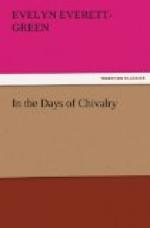She made no response, but her clear gaze was slightly disconcerting; he looked away and spoke rapidly.
“Raymond de Brocas was on board the vessel that bore us from England’s shores: ask if it be not so, an you believe me not. We were brothers in arms, and foes no longer. I sought him out and told him all that was in my heart. You know his nature — brave, candid, fearless. He showed his nobility of soul by giving to me the right hand of fellowship. Ere the voyage ended we were friends in truth. When the day of battle came we rode side by side against the foe.”
Joan’s interest was aroused. She knew Raymond well. She knew his nobility of nature — his generous impulse to forgive a past foe, to bury all enmity. If Sanghurst had sought him with professions of contrition, might he not have easily been believed? And yet was such an one as this to be trusted?
“In the melee — for the fighting was hard and desperate — we were separated: he carried one way and I another. When the French were driven back or taken captive I sought for Raymond everywhere, but for long without avail. At last I found him, wounded to the death. I might not even move him to our lines. I could but give him drink and watch beside him as he slowly sank.
“It was then he spoke of thee, Joan.” Sanghurst’s voice took a new tone, and seemed to quiver slightly; he dropped the more formal address hitherto observed, and lapsed into the familiar “thou.” “The sole trouble upon that pure soul was the thought of thee, left alone and unprotected in this harsh world. He spoke of thee and that love he bore thee, and I, who had also loved, but had resigned all my hopes for love of him, could but listen and grieve with him. But he knew my secret — his clear eyes had long ago divined it — and in talking together of thee, Joan, as we had many times done before, he had learned all there was to know of my hopeless love. As he lay dying he seemed to be musing of this; and one short half-hour before he breathed his last, he spoke in these words —
“’Sanghurst, we have been rivals and foes, but now we are friends, and I know that I did misjudge thee in past days, as methinks she did, too.’ (Joan, this is not so. It was not that ye misjudged me, but that I have since repented of my evil ways in which erst I rejoiced.) ’But thou wilt go to her now, and tell her what has befallen her lover. Tell her that I died with her name on my lips, with thoughts of her in my heart. And tell her also not to grieve too deeply for me. It may be that to die thus, loving and beloved, is the happiest thing that can befall a man. But tell her, too, that she must not grieve too bitterly — that she must not lead a widowed life because that I am taken from her. Give to her this token, good comrade; she will know it. Tell her that he to whom she gave it now restores it to her again, and restores it by the hand of his best and truest friend, trusting that this trusty friend will some day meet the reward he covets from the hand of her who once gave the token to him upon whom the hand of death is resting. Give it her, and tell her when you give it that her dying lover’s hope is that she will thus reward the patient, generous love of him who shall bring it to her.’”




